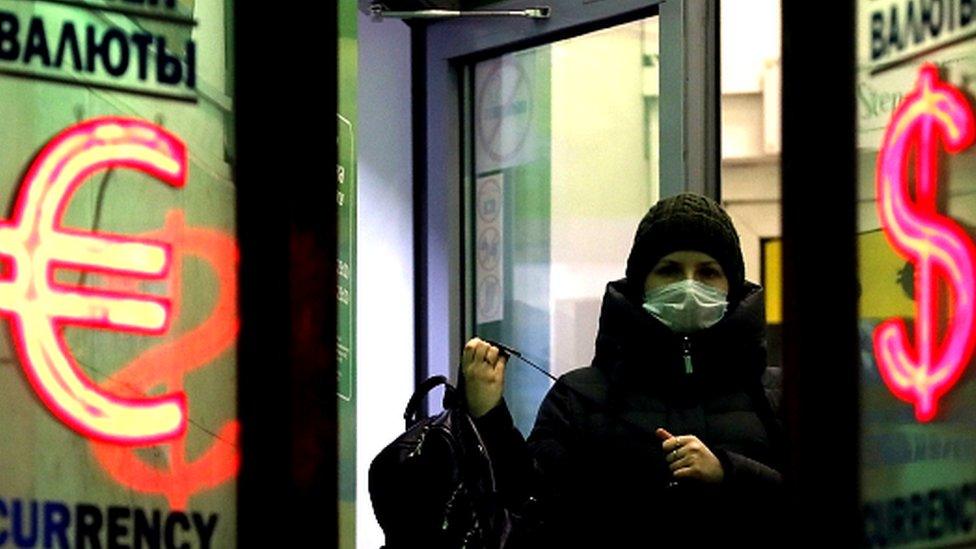West to cut some Russian banks off from Swift
- Published

A foreign exchange bureau in St Petersburg (file picture)
The EU, US and their allies have agreed to cut off a number of Russian banks from the main international payment system, Swift.
The assets of Russia's central bank will also be frozen, limiting Russia's ability to access its overseas reserves.
The intention is to "further isolate Russia from the international financial system", a joint statement said.
Russia is heavily reliant on the Swift system for its key oil and gas exports.
The joint sanctions are the harshest measures imposed to date on Russia over its invasion of Ukraine.
Swift, or the "Society for Worldwide Interbank Financial Telecommunication", is a secure messaging system that makes fast, cross-border payments possible, enabling international trade.
Based in Belgium, it facilitates transactions between more than 11,000 banks and financial institutions across the globe.
It plays a pivotal role in supporting the global economy, but has no authority to make sanction decisions itself.
The banks affected were not immediately named, but the German spokesman said they would include "all those already sanctioned by the international community, as well as other institutions, if necessary".
Removal from Swift is deemed to be a severe curb because almost all banks use the system.
The measures were agreed by the US, UK, Europe and Canada.

Russia's economy will be hit hard

Excluding certain Russian banks from the Swift system used for trillions of dollars-worth of transactions will hit the economy hard - and in the words of the White House, it will make the country rely on "the telephone or a fax machine" to make payments.
This is only a slight exaggeration. There are workarounds to Swift but none which are as efficient.
When Iran was cut out of the system in 2012, as part of sanctions over its nuclear programme, it lost 30% of its foreign trade.
Picking certain Russian banks will ensure the sanctions have the maximum impact on Russia, while preventing too much impact on Europe. European businesses will be able to continue to collect money owed and buy Russian energy.
Other measures are equally powerful. Curbs on Russia's central bank will stop it using its currency to limit the effect of sanctions.
Russia has been building up a cushion of foreign currency to protect its banks, but this new measure will significantly decrease the reserves available.
The impact of these measures may take a while to show - but they do express an immediate intent from Western nations.

Ursula von der Leyen, president of the European Commission, said the decision to paralyse the assets of Russia's central bank would stop the Kremlin from "using its war chest".
The EU and its partners agreed to freeze the bank's transactions and prevent it from liquidating its assets.
She added there would be a crackdown on so-called "golden passports" that "let wealthy Russians connected to the Russian government become citizens of our countries and gain access to our financial systems".
UK Prime Minister Boris Johnson said Britain had taken "decisive action", tweeting: "We will keep working together to ensure Putin pays the price for his aggression."
Responding to the announcement, Ukraine's Prime Minister Denys Shmyhal tweeted his appreciation for the sanctions, calling them a "real help during this dark time".
EU foreign ministers are set to meet on Sunday to co-ordinate member states' military aid to Ukraine, and discuss humanitarian assistance for the country and those fleeing the conflict.